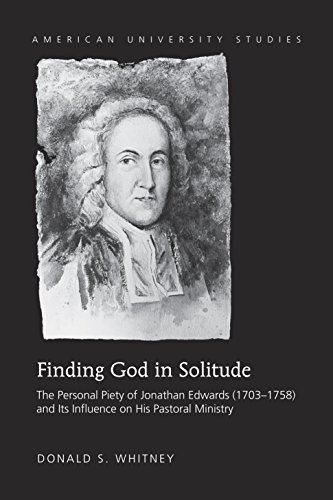Finding God in Solitude: The Personal Piety of Jonathan Edwards and Its Influence on His Pastoral Ministry
Finding God in Solitude explores the devotional piety of one of America’s most important religious figures, Jonathan Edwards (1703–1758) of Massachusetts. From his childhood to his death shortly after becoming president of Princeton, and especially from his Christian conversion through his Northampton pastorate and the Great Awakening to his missionary work among Indians on the frontier, Edwards’ personal spirituality is evaluated, particularly in terms of its impact upon his pastoral ministry. Specifically, the influence of his private piety on his public labors is considered in terms of his pastoral relationships, his pastoral preaching, and his pastoral publications. Edwards’ piety and his pastoral ministry are also assessed in light of their relative consistency with both the English Puritan and Colonial New England Puritan heritage from which Edwards was descended. This book would be useful in courses on Jonathan Edwards, American religious history, Colonial New England, Puritanism, Christian spirituality, or pastoral ministry. Read Doug Sweeney's review of Finding God in Solitude originally written for the Jonathan Edwards Center at Trinity Evangelical Divinity School. Donald S. Whitney’s, Finding God in Solitude arrives amidst a growing interest in Jonathan Edwards’ devotional life, both private and public. Whitney’s work taps into several important veins of Edwards scholarship, including his role as a minister and his ‘God-centered’ theology. Whitney has both a historical and a contemporary approach, seeking to understand Edwards in context while exploring how he can and cannot be used as a resource for the pious life and for ministry today. Whitney’s driving question is, What was the relation of Edwards’ piety to his pastorate, how were they related, and how can we detect that relation? He finds, above all, an Edwards steeped in ‘Christian solitude’, seeking personal experience with God, but out of this came a ministry defined by a God who was beautiful and communicative. Whitney’s use of primary and secondary sources is broad yet discriminating. He has a sound knowledge of scholarship on Edwards, and effectively utilizes Edwards’ personal writings, correspondence, sermons, and pastoral writings. What Whitney has done, therefore, is to provide the first full-length exploration of Edwards’ personal pious practices. - Kenneth P. Minkema, Executive Director, Jonathan Edwards Center, Executive Editor, The Works of Jonathan Edwards, Yale University Piety was central to the life of Jonathan Edwards, America’s greatest Evangelical theologian. Moreover, he was an heir to one of the richest traditions of Christian piety in the history of Christianity, namely that of Puritanism. So it is a surprise that relatively little by way of critical scholarship has been done on this area of his life. This new work by Donald S. Whitney admirably helps fill this gap in Edwards studies. Here, in so far as Edwards’s extant corpus allows, we have a detailed reflection on key aspects of Edwards’ inner walk with God. And as such, it is a fabulous introduction to not only Edwards, but to the spirituality of late Puritanism and early Evangelicalism. - Michael A.G. Haykin, Professor of Church History and Biblical Spirituality, Southern Baptist Theological Seminary, Louisville, Kentucky; Director of the Andrew Fuller Center for Baptist Studies; Author of Jonathan Edwards: The Holy Spirit in Revival and Co-Author of Travel with Jonathan Edwards Please Note: We do not stock this particular book at The Center for Biblical Spirituality. This book is so expensive because it is published by a university press in very low quantities.
